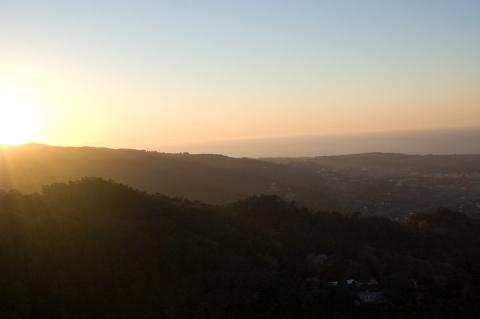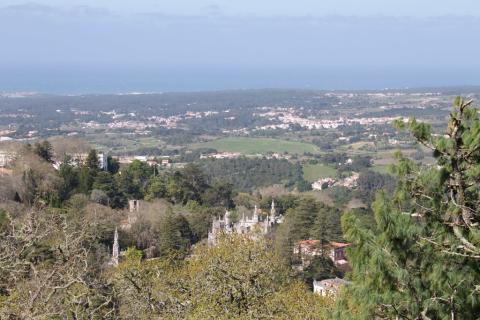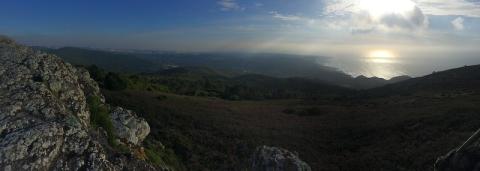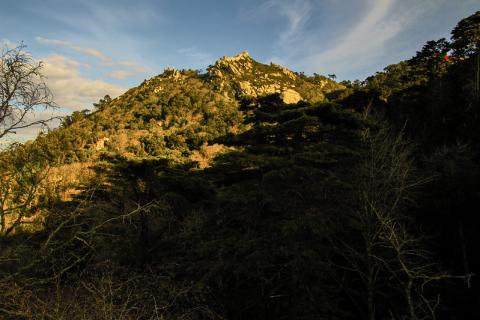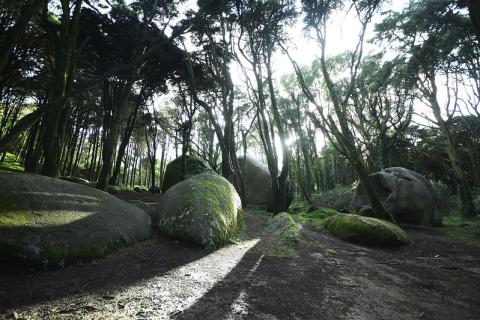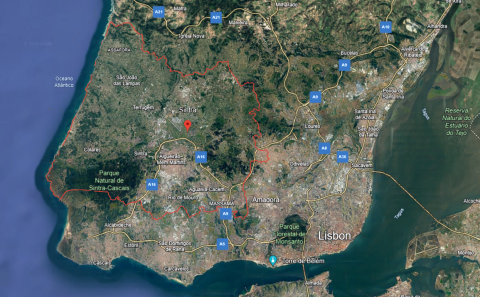Est locus, occiduās ubi sōl aestīvus ad ōrās
inclīnat radiōs, nocte premente diem:
Ōceanumque petit, currūque invectus eburnō,
iam cursū lassōs aequore tingit equōs.
Vallis ubi inclūsa, scopulīs ad sīdera ductīs, 5
dēflectit clīvōs: murmurat intus aqua.
Obiicit Ōceanō mōlem, ternaeque minantur
excelsae rūpēs tangere tēcta polī.
Et nisi condēnsī cingant fastīgia nimbī,
hīs caelum crēdās sistere verticibus. 10
Rūpibus hīs Faunī, sunt hīc quoque lustra ferārum,
vēnātor mātrēs fīgat ubi et catulōs.
notes
There is a place in the far west, at the edge of the Ocean, a well-watered valley near three high mountain peaks. There are also hunting grounds there.
1 locus: the famous Sintra forest in Portugal, now within the Sintra-Cascais Natural Park.
1-2 occiduās ubi sōl aestīvus ad ōrās inclīnat radiōs: order: ubi aestivus sol inclinat radios ad occiduas oras.
2 diem: direct object of the participle premente in the ablative absolute nocte premente, “with the night pressing (on) the day.”
3 invectus: "carried." This verb normally takes an ablative for what someone is carried on: currūque eburnō.
4 cursu: "on its course."
4 lassōs aequore tingit equōs: sol is the subject of tingit, the direct object is lassos equos, and aequore is an ablative of place where with tingit.
5 vallis: nominative = vallēs, as commonly in Ovid.
5 scopulīs ad sīdera ductīs: ablative absolute.
6 intus: adverbial, “inside,” “within.”
7 Obiicit Ōceanō mōlem: “it hurls its mass on the ocean.” Ōceanō is dative, normal with the compound verb obicio.
7-8 ternae ... excelsae rūpēs: "three lofty crags," the Sintra mountains are a granite massif 10 km long. The three dominant high points of the Serra de Sintra skyline above the town are Cruz Alta (529m, site of a conspicuous cross), the Pena summit (510m, crowned by the Hieronymite monastery), and Alto do Monge ("the Monk," 490m).
7 minantur: "threaten” + infinitive, tangere, “to touch.”
8 poli: "the heavens" (LS polus II.B). Genitive describing tēcta, which is the direct object of tangere, “the roof of the heavens.”
9 Et nisi condēnsī cingant fastīgia nimbī: apodosis of a future less vivid condition. Condēnsī nimbī is the subject of the verb and fastīgia its direct object.
10 credas: subjunctive in the protasis of a future less vivid condition. It introduces indirect statement: caelum sistere verticibus, “that the sky stood on its summits.”
11 rūpibus hīs: refers to the his verticibus in the previous line. Supply sunt. On the top of the mountain there are crags.
11 lustra: "dens (of wild beasts)," LS lustrum II.A.
12 figat: "might pierce" potential subjunctive (AG 447.3). Mātrēs et catulōs are the direct object of figat.
vocabulary
occiduus -a -um: going down, setting; falling
aestīvus –a –um: of or pertaining to summer, summer–like, summer
ōra –ae f.: shore, coast; region, district
inclīnō inclīnāre inclīnāvī inclīnātus: to bend, tilt
radius radi(ī) m.: ray
Ōceanus –ī m.: Oceanus, the ocean
invehō –ere –vexī –vectus: to carry into or forward; (pass.), invehi, to ride or drive; sail; w. acc. of place, sail to, arrive at, or in; enter
eburneus (eburnus) –a –um: of ivory
lassus –a –um: tired, weary
tingō (tinguō) tingere tinxī tinctum: to wet, moisten; dye, color
vallēs vallis f.: valley 5
inclūdō inclūdere inclūsī inclūsus: to shut up/in, imprison, enclose
scopulus –ī m.: a high cliff or rock
dēflectō –ere –flexī –flexus: to turn aside
clīvus –ī m.: a declivity, slope, ascent, hill, eminence
murmurō murmurāre murmurāvī murmurātus: to murmur, mutter, roar (> murmur)
intus: within, on the inside, inside; at home
obiiciō obiicere obiēcī obiectus: to throw before, put in the way (+ dat.)
mōlēs mōlis f.: a large mass
ternī –ae –a: three-fold
minor minārī minātus sum: to threaten
excelsus –a –um: lofty, high
rūpēs –is f.: a rock, cliff, crag, ledge
polus –ī m.: the celestial pole; (meton.), the heavens, sky; air
condēnsus –a –um: thick, crowded, close together
fastīgium fastīgi(ī) n.: summit
nimbus –ī m.: rain–cloud
caelum –ī n.: the sky, the heavens 10
sistō sistere stitī status: to cause to stand; set up
vertex verticis m.: peak, summit
Faunus –ī m.: Faunus, the tutelary god of husbandmen, identified by the Romans with the Greek Pan (> faveo); (in pl.) country deities, identified with (Greek) Satyrs
lustrum –ī n.: den or haunt of wild beasts
fera ferae f.: wild animal
vēnātor –ōris m.: a huntsman
fīgō fīgere fīxī fīxus: transfix, pierce
catulus –ī m. or catula (catella) –ae f.: the young of wild animals, a cub, whelp

